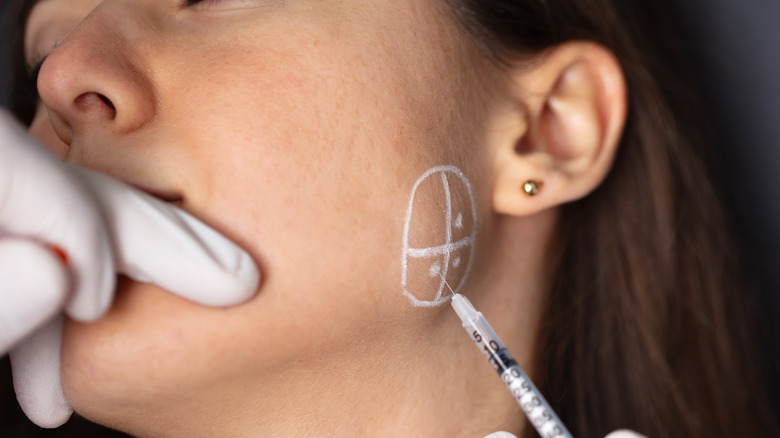Masseter Botox Can Help With TMJ And Jaw Pain - Not To Mention Sculpt Your Jawline
Botox and other types of cosmetic procedures have long been taboo in our society. Whether it was a sense of shame someone felt about changing their appearance or their fear of judgment from others, it's safe to say we've come a long way. Celebrities like the Kardashians began normalizing the work they received early on, and now many social media influencers are also choosing to be honest with their followers.
While Botox is typically used to minimize the look of wrinkles on the face, there are other less cosmetic benefits, such as treating frequent migraines or reducing jaw pain. The masseter muscle is located on the lower jaw and can be seen when you clench your teeth together. Often, those who need to wear night guards or struggle with teeth grinding benefit from getting Botox injected into this muscle because it releases tension.
While masseter Botox will certainly change the shape your jawline, the muscle will also decrease in size and help you relax your jaw. This makes the procedure a win-win in the eyes of many people, especially those who have TMJ.
What is TMJ?
TMJ stands for the temporomandibular joint, which is located on both sides of the jaw. These joints allow you to move your lower jaw bone and connect it to your skull. You can actually feel this happening if you put your fingers right in front of your ears and open your mouth. You may even hear clicking when your jaw moves but it's only a cause for concern if it's painful. When the joints or surrounding muscles continue to hurt, that's when you know there's a problem.
While some research suggests a genetic component to TMJ, other causes of why people start experiencing pain likely have to do with periods of stress in life. Many people hold a lot of tension in their mouths, leading to tension headaches, clenching or grinding of their teeth, and jaw pain.
Understanding your symptoms and sharing them with your doctor or even your dentist can help you pinpoint TMJ and analyze if botox is right for you. If mouth guards, prescription medication, and other treatment recommendations haven't worked, you may start looking into other options or even questioning if botox helps with teeth grinding. Luckily, many have found that getting botox injections into the masseter muscle is actually life-changing.
What are the long-term effects of masseter Botox?
Struggling to have a normal life amidst daily migraines, painful chewing, or sleeping through nights of teeth grinding will eventually start to wear on you. While self-care days are great for brain health, those who feel like they've lived in a chronically stressed state for years likely can't fix their jaw pain through jade rolling and at-home facials alone. The thought of getting Botox injections can sound extreme but for some, that may be exactly what they're looking for.
Thinking through the pros and cons is important with any medical decision; Botox injections are no exception. As Glamour points out, treatment hasn't been FDA-approved for TMJ specifically and the medical community is still divided on the side effects. While some studies show a possible link to bone loss with consistent injections of high doses, the official jury's still out on the longer-term health risks.
Interestingly, you may find that your dermatologist recommends Botox to help ease your pain in the short term. However, seeking a second opinion from your primary care doctor, or even a third opinion from your dentist is a great rule of thumb. Ultimately, the decision is yours and it shouldn't come with any judgment. Of course, the thought of having a sculpted jawline may also be in the back of your mind. So, understanding the concerns along with the benefits will help you make an informed choice that is right for you.


